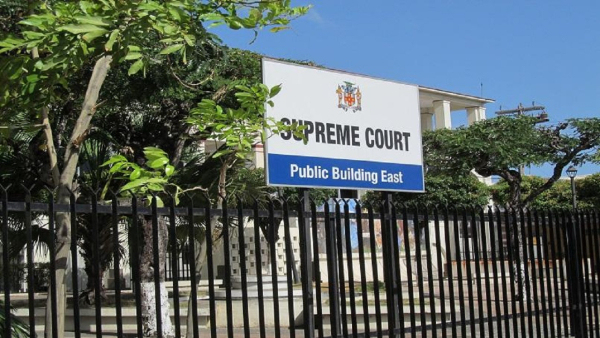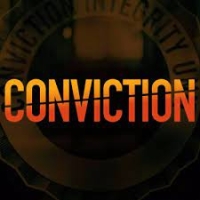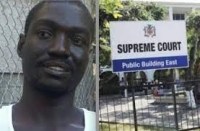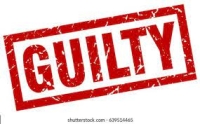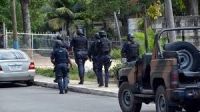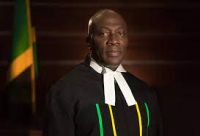Sykes made the disclosure during the opening day of his summation of the evidence in the case in the Home Circuit Court in downtown Kingston on Monday.
"Since September of last year, there's a new statute governing possession, use of firearms. So, that statute became law during this trial," Sykes said.
"Now, Section 27 of the Interpretation Act, as well as decisions from the Court of Appeal Jamaica and the Privy Council, have made it very clear that this trial has to proceed... as if the repealed Firearms Act was still in force," he added
On that score, the chief jurist said offences of illegal possession of firearm and illegal possession of ammunition that are listed on the indictment in the case "will be analysed in the context of the repealed statute, and not the current statute."
The consequential amendments made to the Offences Against the Person Act has increased the penalty provisions for Sections 13, 16 and 17 by including a mandatory minimum sentence of 15 years for offences involving the use of a firearm.
In addition, under Section 20(2), the mandatory sentence has been increased from 15 years to 20 years in keeping with the penalty regime in the current Act.
However, those will not apply to the accused in this trial if they are convicted, as explained by Sykes.
A total of 27 defendants, including alleged gang leader, Andre 'Blackman' Bryan, remain on trial, with the only accused who was on bail, Andre 'Bolo' Smith, having been shot and killed on Hagley Park Road in St Andrew on Wednesday, August 10, 2022.
Initially, 33 defendants were on trial, but five others were freed due to insufficient evidence being presented against them, while Smith was later killed.
Ahead of Sykes' summation on Monday, a police detective took the witness stand and gave evidence that Smith was killed last August on Hagley Park Road in St Andrew.
However, the officer said he is still awaiting the post-mortem report from the St Andrew South Police Division, to tender into evidence.
Sykes' highly anticipated summation then got under way shortly after.
In it, he pointed out that he will consider the secret cell phone recordings that were made by a former gangster turned-state-witness, who has described himself as a former don.
Sykes, however, recognised that mistakes can be made in voice recognition, and said he will have to be weighed in the overall determination of whether the 27 accused were working together as a criminal organisation.
The secret recordings were made by the former gangster after he downloaded a call record application on three cell phones.
The devices captured the purported voices of those on trial, including Bryan and another alleged senior operative of the gang, Stephanie 'Mumma' Christie, a St Thomas pastor, as they discussed murders, betrayal and plans to reorganise the criminal network after Bryan was detained by law enforcers.
According to Sykes, voices can be mistaken, which, in previous cases, have led to wrongful convictions.
The former self-styled don had listened to the recordings in court, and subsequently identified the accused persons relative to the voices on the recordings.
Interestingly, the witness identified the voice of defendant Jason Brown, alias 'City Puss', but did not identify him during the trial, as the accused was incarcerated at the time the offences took place.
Brown was allegedly threatening business people to pay extortion money in Spanish Town, and having conversations on cell phones, all while behind bars at Horizon Adult Remand Centre in St Andrew.
"Similar to visual identification, the analytical process can be divided into two parts; prior knowledge of the voice, (and) sufficient opportunity to hear and recognise the voice on the day or dates being questioned of the particular offence(s)," Sykes explained.
"It is not unknown that errors are made and have been made in respect of voice identification, even in respect of persons who are well known to the witness," he stressed in respect to voice identification.
Meanwhile, Sykes said the court has to also consider inconsistencies, omissions and discrepancies relative to the case, and pointed out by the defence.
The attorneys representing the accused have branded the testimonies of the two former gangsters-turned-state-witnesses as being unreliable, untrue and not credible.
Sykes said omissions from the witnesses could create doubt, influence their credibility, and question the reliability of the evidence that was given in court.
While noting that he will have to assess the extent of these omissions, the judge said such omissions are not uncommon to criminal trials.
Further, Sykes said he has acknowledged one of the defendant's omission of not having a previous conviction.
He said good character is not a defence during a criminal trial, but it assumes great significance.
Sykes has also indicated that the court will consider malicious intent on the part of the prosecution's two key witnesses.
For example, defence attorney Courtney Rowe told Sykes during his closing arguments last year that his (Rowe's) client, Marco Milller, and a former self-styled don who testified for the crown, were in a disagreement over a woman.
It was suggested earlier in the trial that Miller and the witness shared the same woman.
According to Rowe, it was rumoured that Miller had impregnated the woman.
The attorney said the testimony from the witness against his client was fuelled by jealousy and malice.
Miller remains on charges of being part of a criminal organisation and conspiracy to commit murder in relation to the killing of two men from Denham Town, West Kingston. Their bodies were reportedly buried in Rivoli in Spanish Town, St Catherine.
Sykes on Monday said the court will have to weigh if there is any substance to be found in that assertion from Rowe.
The judge also noted that overall, the court will have to examine what comprises a criminal organisation, and whether all 27 accused persons were actively participating in the gang, as has been suggested by the crown.
The remaining accused, including Bryan, are being tried under the Criminal Justice (Suppression of Criminal Organisations Act), 2014, better known as the anti-gang legislation, on an indictment containing several counts, including murder and arson.
The offences were allegedly committed between January 1, 2015 and June 30, 2019, mainly in St Catherine, with at least one murder being committed in St Andrew.
